Bourke Ulick J. Aryan Origin of the Gaelic Race and Language
Подождите немного. Документ загружается.

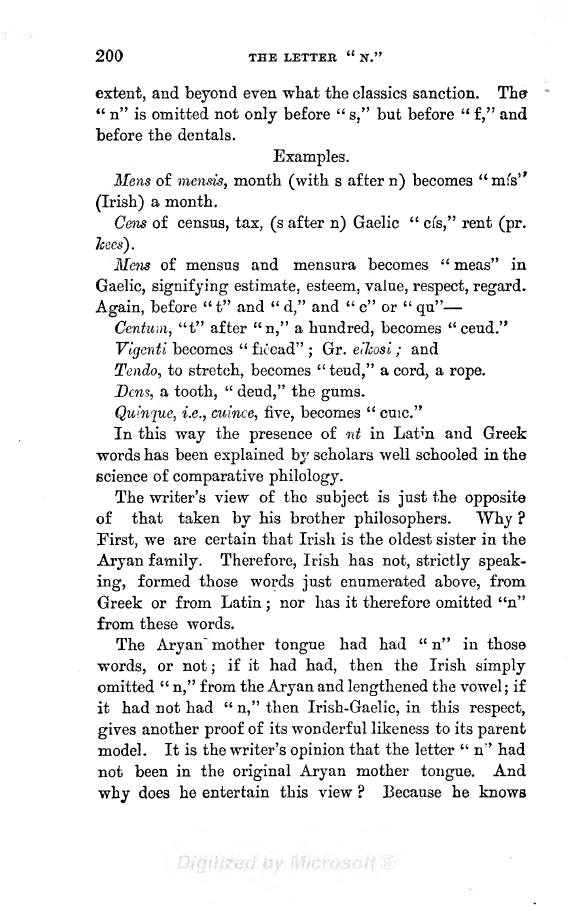
200
THE LETTER
"
N."
extent,
and
beyond
even
what
the classics
sanction.
Ther
"
n"
is omitted
not
only
before
"
s,"
but before
"
f,"
and
before
the dentals.
Examples.
Mens
of
mensis,
month
(with
s
after
n)
becomes
"
mfs''
(Irish)
a
month.
Gens
of
census, tax,
(s
after
n)
Gaelic
"
ci's,"
rent
(pr.
Metis
of
mensus
and mensura becomes
"
meas"
in
Gaelic,
signifying
estimate, esteem, value,
respect,
regard.
Again,
before
"
t" and
"
d,"
and
"
c"
or
"
qu"
Centum,
"t"
after
"n,"
a
hundred,
becomes
"
ceud."
Vigenti
becomes
"
ficead"
;
Gr.
eiJcosi
;
and
Tendo,
to
stretch,
becomes
"
teud,"
a
cord,
a
rope.
Dens,
a
tooth,
"
deud,"
the
gums.
Quinque,
i.e.,
cuince,
five,
becomes
"
cuic."
In
this
way
the
presence
of
nt
in Latm and
Greek
words
has been
explained by
scholars
well schooled
in
the
science
of
comparative philology.
The
writer's
view of the
subject
is
just
the
opposite
of
that taken
by
his
brother
philosophers.
Why
?
First,
we are
certain that
Irish
is
the oldest sister
in the
Aryan family.
Therefore,
Irish has
not,
strictly
speak-
ing,
formed
those words
just
enumerated
above,
from
Greek
or from Latin
;
nor
has
it therefore omitted
"n"
from
these
words.
The
Aryan~
mother
tongue
had
had
"
n" in
those
words,
or
not;
if it had
had,
then the
Irish
simply
omitted
"
n,"
from
the
Aryan
and
lengthened
the
vowel;
if
it
had not
had
"
n,"
then
Irish-Gaelic,
in
this
respect,
gives
another
proof
of its wonderful likeness
to
its
parent
model.
It is
the
writer's
opinion
that the
letter
"
n
: '
had
not
been
in
the
original
Aryan
mother
tongue.
And
why
does
he
entertain this
view
? Because
he
knows

COMPOSITIVE
CAPABILITY
201
that
Greek
and
Zend
and Welsh resemble
high
Aryan
more
closely
than
the
primitive
low
Aryan
spoken
in
pre-historic
times,
in the
valleys
of Armenia
and
Persia.
He is
of
opinion
that words
in
those
languages possess
the
secondary
rather than the
primary
forms
of
the initial
consonants.
What,
then
?
Nature
always
endeavours
to
supply
as best
she can
the deficit caused
by
a
want
or
defect.
To
supply,
in these
instances,
for the omission
of
the
initial
radical
consonants,
the
words take
"
n,"
as
"
siad,"
Irish,
personal
pronoun,
meaning they
or
them,
and
pi'onounced
"
sheeath,"
makes
liwynt
Welsh..
How
?
The sound
of
"
s" is
omitted,
or its
affected
form
"
h"
assumed
in its stead
;
"
t" and
"
w"
are the letters which
in
Welsh
express
the
vocal value
of the Irish
"
d"
and
"u."
Thus,
"
siacl,"
they,
becomes
hwit, and,
to
supply
for the omission
of
"
s," "n,"
is
inserted before
the
final
consonant,
kwynt
so
"
ceud,"
becomes
cent,
Latin
;
ckaton,
Greek
;
"
cuig,"
five,
qiiinqiie
;
"
teud,"
is
tendo
;
"
deud"
is
dens,
dentis.
SEVENTEENTH
CAPABILITY OF IRISH-GAELIC
OF
PRODUCING
COMPOUNDS.
The
third
reason
assigned
just
above
for the
great
family
likeness between Irish-Gaelic
and
its
prototype
is,
that
in
its
plastic
power
it
presents,
in a
pre-eminent
degree,
a
ready facility
for
composition
and
a wonderful
adaptability
to
express
fresh
or factitious
ideas,
as
they
are
called,
by
new combinations
of efforinatives
and
pre-
formatives.
What
does Zeuss
say
of its
power
in
this
respect
?
And
no
scholar
living
in
the
present century
or in
the
past
knew
better
than he
what
the resources
of Irish-Gaelic
are
in
this
way.
He
was a
thorough
master
of
his
native
language
the
German.
Latin and Greek
were
as
familiar
to
him
as
his
own
tongue,
for,
he
wrote
in
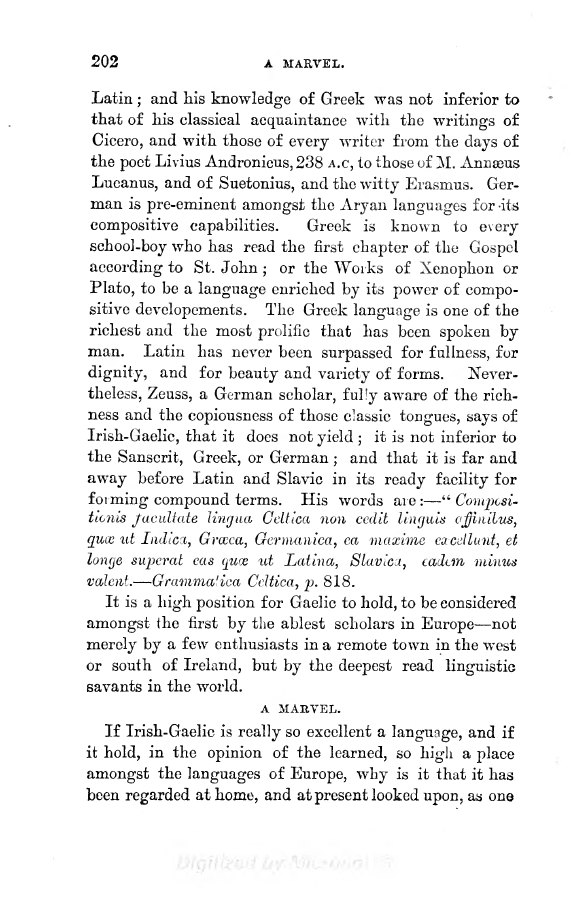
202 A
MARVEL.
Latin
;
and
his
knowledge
of
Greek was not
inferior to
that
of his
classical
acquaintance
with the
writings
of
Cicero,
and with
those of
every
writer
from
the
days
of
the
poet
Livins
Andronicus,
238
A.C,
to
those
of
M.
Annaeus
Lucanus,
and
of
Suetonius,
and the
witty
Erasmus. Ger-
man
is
pre-eminent
amongst
the
Aryan
languages
for
-its
compositive
capabilities.
Greek
is known
to
every
school-boy
who
has read the first
chapter
of
the
Gospel
according
to
St. John
;
or
the
Works
of
Xenophon
or
Plato,
to be
a
language
enriched
by
its
power
of
compo-
sitive
developements.
The
Greek
language
is one of the
richest and
the
most
prolific
that
has
been
spoken
by
man.
Latin
has never
been
surpassed
for
fullness,
for
dignity,
and
for
beauty
and
variety
of forms. Never-
theless, Zeuss,
a
German
scholar,
fully
aware
of
the
rich-
ness
and
the
copiousness
of those
classic
tongues, says
of
Irish-Gaelic,
that
it does
not
yield
;
it is not
inferior to
the
Sanscrit,
Greek,
or
German
;
and that it is
far and
away
before Latin
and
Slavic in
its
ready facility
for
forming compound
terms.
His
words
are :
"
Contpcsi-
tionis
facilitate lingua
Celtica non ccdit
linguis affinibuq,
quce
ut
Indicd,
Grceca,
Germanica,
ea maxime
ecccellunt,
et
longe
superat
eas
guce
ut
Latina,
Slavica,
eadcm minus
valent.
Grammaiica
CcUica,
p.
818.
It
is
a
high
position
for
Gaelic to
hold,
to be
considered
amongst
the
first
by
the
ablest scholars
in
Europe
not
merely by
a few
enthusiasts in
a remote town in the
west
or
south
of
Ireland,
but
by
the
deepest
read
linguistic
savants
in the world.
A
MARVEL.
If
Irish-Gaelic
is
really
so
excellent
a
language,
and
if
it
hold,
in
the
opinion
of the
learned,
so
higii
a
place
amongst
the
languages
of
Europe,
why
is
it
that
it
has
been
regarded
at
home,
and at
present
looked
upon,
as one
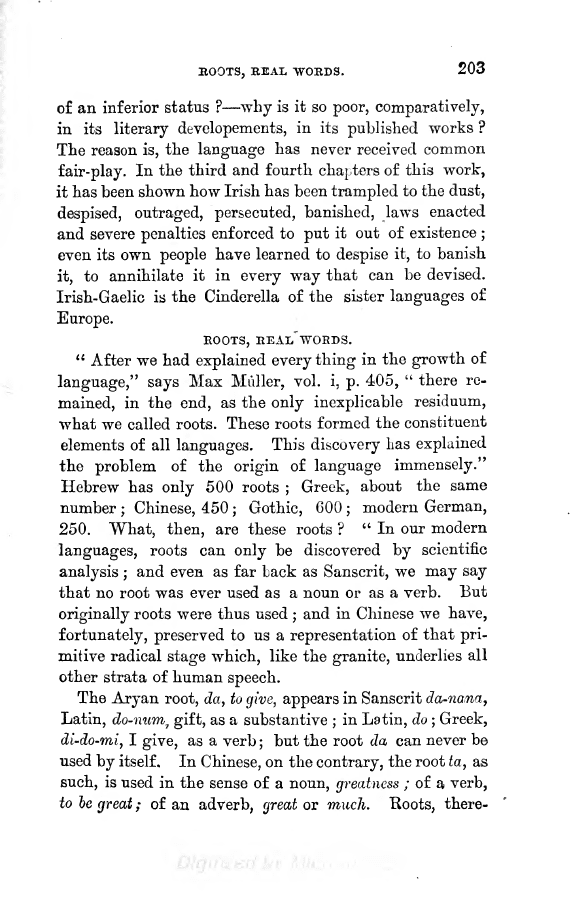
BOOTS,
REAL
WORDS.
203
of
an
inferior
status
?
why
is
it
so
poor,
comparatively,
in its
literary
developements,
in
its
published
works ?
The reason
is,
the
language
has
never
received
common
fair-play.
In
the third
and fourth
chapters
of
this
work,
it
has
been
shown how
Irish has been
trampled
to
the
dust,
despised,
outraged, persecuted,
banished,
laws
enacted
and severe
penalties
enforced to
put
it out of existence
;
even
its own
people
have
learned to
despise
it,
to
banish
it,
to annihilate
it
in
every way
that
can
be devised.
Irish-Gaelic
is
the Cinderella of
the sister
languages
of
Europe.
ROOTS,
REAL'WORDS.
"
After we
had
explained
every
thing
in
the
growth
of
language,"
says
Max
Miiller,
vol.
i.
p.
405,
"
there
re-
mained,
in the
end,
as the
only inexplicable
residuum,
what we called roots.
These
roots
formed
the constituent
elements
of all
languages.
This
discovery
has
explained
the
problem
of the
origin
of
language
immensely."
Hebrew has
only
500 roots
;
Greek,
about
the
same
number
; Chinese,
450
;
Gothic,
600
;
modern
German,
250.
What,
then,
are these roots
?
"
In
our
modern
languages,
roots
can
only
be
discovered
by
scientific
analysis
;
and
even
as far back as
Sanscrit,
we
may
say
that
no root was ever used as
a noun or as
a verb.
But
originally
roots were thus used
;
and
in Chinese
we
have,
fortunately,
preserved
to
us
a
representation
of
that
pri-
mitive radical
stage
which,
like
the
granite,
underlies
all
other
strata of human
speech.
The
Aryan
root,
da,
to
give,
appears
in
Sanscrit
da-nana,
Latin,
do-mim
7
gift,
as
a
substantive
;
in
Latin,
do
;
Greek,
di-do-mi,
I
give,
as
a
verb;
but
the
root da can
never be
used
by
itself.
In
Chinese,
on the
contrary,
the
root
ta,
as
such,
is
used in the
sense of a
noun,
greatness
;
of
a
verb,
to le
great
;
of
an
adverb,
great
or much.
Roots,
there-
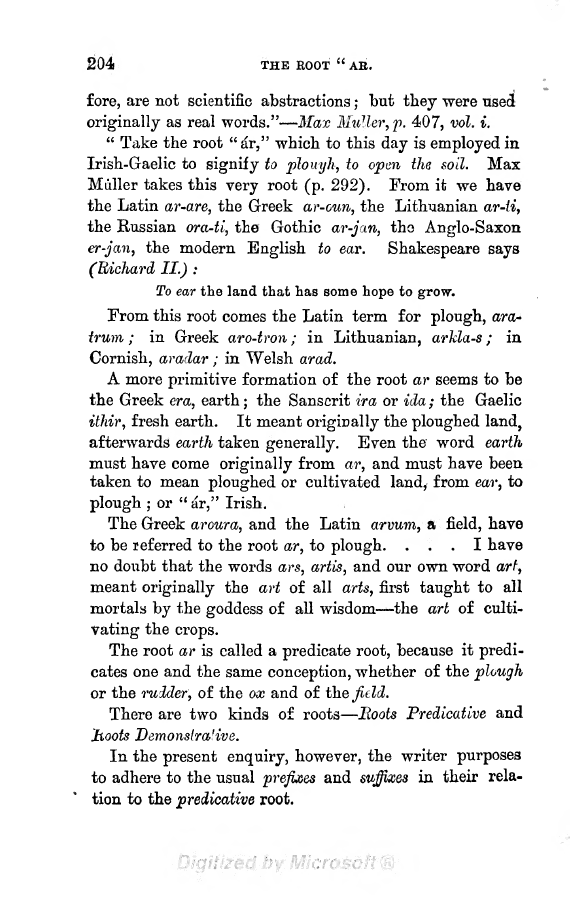
204
THE ROOT
"
AH.
fore,
are
not scientific
abstractions
;
but
they
were
used
originally
as real
words."
Max
Muller,p.
407,
vol.
i.
"
Take
the
root
"ar,"
which
to this
day
is
employed
in
Irish-Gaelic
to
signify
to
plouyh,
to
open
the soil. Max
Mailer takes
this
very
root
(p. 292).
From it
we have
the
Latin
ar-are,
the Greek
ar-cun,
the
Lithuanian
ar-ti,
the
Russian
ora-ti,
the
Gothic
ar-jan,
tho
Anglo-Saxon
er-jan,
the
modern
English
to ear.
Shakespeare
says
(Richard II.)
:
To
ear the land
that has some
hope
to
grow.
From this
root
comes the
Latin
term for
plough,
ara-
trum
;
in
Greek aro-tron
;
in
Lithuanian,
arkla-s
;
in
Cornish,
aradar
;
in
Welsh
arad.
A
more
primitive
formation
of the root ar seems
to
be
the
Greek
era,
earth;
the
Sanscrit
ira or
ida;
the Gaelic
ithir,
fresh
earth. It
meant
origirally
the
ploughed
land,
afterwards earth
taken
generally.
Even
the word
earth
must have come
originally
from
ar,
and must
have been
taken
to
mean
ploughed
or
cultivated
land,
from
ear,
to
plough
;
or
"
ar,"
Irish.
The
Greek
aroura,
and
the
Latin
arvum,
a
field,
have
to
be
referred
to
the
root
ar,
to
plough.
...
I
have
no
doubt that
the words
ars, artis,
and our
own
word
art,
meant
originally
the
art
of
all
arts,
first
taught
to all
mortals
by
the
goddess
of all wisdom
the
art
of culti-
vating
the
crops.
The
root
ar
is called
a
predicate
root,
because
it
predi-
cates
one
and
the
same
conception,
whether
of
the
plough
or
the
rudder,
of
the
ox and of the
field.
There
are two kinds of roots Hoots
Predicative
and
hoots
Demonstrative.
In the
present enquiry,
however,
the writer
purposes
to
adhere to
the usual
prefixes
and
suffixes
in
their
rela-
tion to
the
predicative
root.
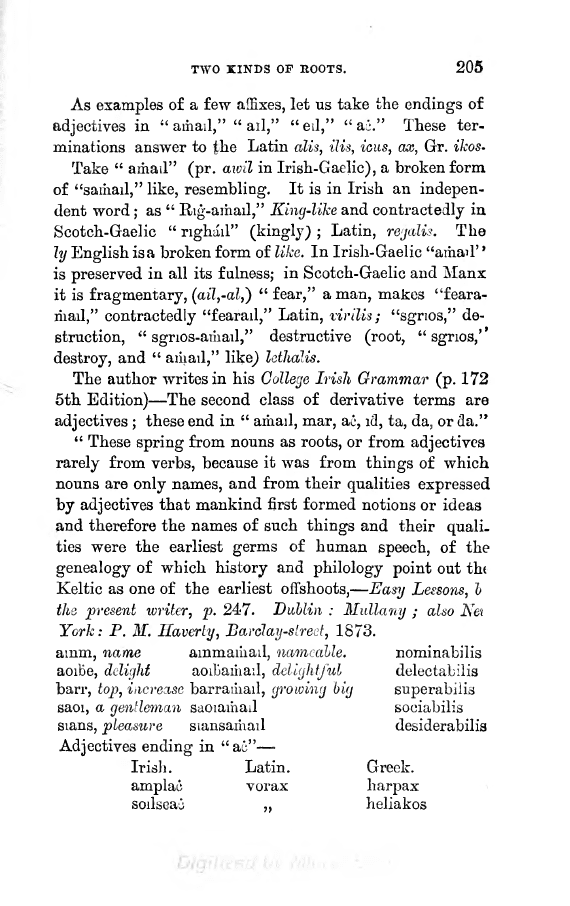
TWO
KINDS
OF
BOOTS.
205
As
examples
of a
few
affixes,
let us
take
the
endings
of
adjectives
in
"
aihail,"
"ail,"
"eil,"
"aj."
These
ter-
minations answer
to the
Latin
alis,
His,
icus,
ax,
Gr.
ikos~
Take
"
amad"
(pr.
awil
in
Irish-Gaelic),
a
broken
form
of
"sarhail," like,
resembling.
It is
in Irish an
indepen-
dent
word
;
as
"
Rig-amail,"
King-like
and
contractedly
in
Scotch-Gaelic
"
righail" (kingly)
;
Latin,
recalls.
The
ly
English
is
a
broken
form of like.
In Irish-Gaelic "amaiF
'
is
preserved
in all its
fulness;
in
Scotch-Gaelic
and
Manx
it is
fragmentary, (cu7,-al,)
"
fear,"
a
man,
makes "feara-
mail,"
contractedly
"fearail,"
Latin,
lirilis
;
"sgrios,"
de-
struction,
"
sgrios-ariiail,"
destructive
(root,
"
sgrios,'
'
destroy,
and
"
ariiail,"
like,)
lethalis.
The author writes
in his
College
Irish Grammar
(p.
172
5th
Edition)
The second
class
of
derivative
terms
are
adjectives
;
these
end in
"
aihail, mar, ae, id, ta, da,
or da."
"
These
spring
from nouns as
roots,
or from
adjectives
rarely
from
verbs,
because
it
was from
things
of
which
nouns are
only
names,
and from their
qualities
expressed
by
adjectives
that mankind
first formed
notions or
ideas
and therefore the names of such
things
and
their
quali-
ties were the earliest
germs
of
human
speech,
of the
genealogy
of
which
history
and
philology point
out tht
Keltic as
one
of the
earliest
offshoots,
Easy
Lessons,
1}
the
present
writer,
p.
247.
Dublin
:
Mullany
;
also
Ne
r
i
York: P. M.
Eaverty,
Barclay-sired,
1873.
amm,
name
ammariiail,
namcable.
nominabilis
aoibe,
delight
aoiBamail,
delightful
delectabilis
barr,
top,
increase
barramail,
growing big superabilis
saoi,
a
gentleman
saoiaihail sociabilis
sians,
pleasure
siansamail
desiderabilis
Adjectives
ending
in
"ac"
Irish. Latin.
Greek,
amplac
vorax
harpax
soilseai heliakos
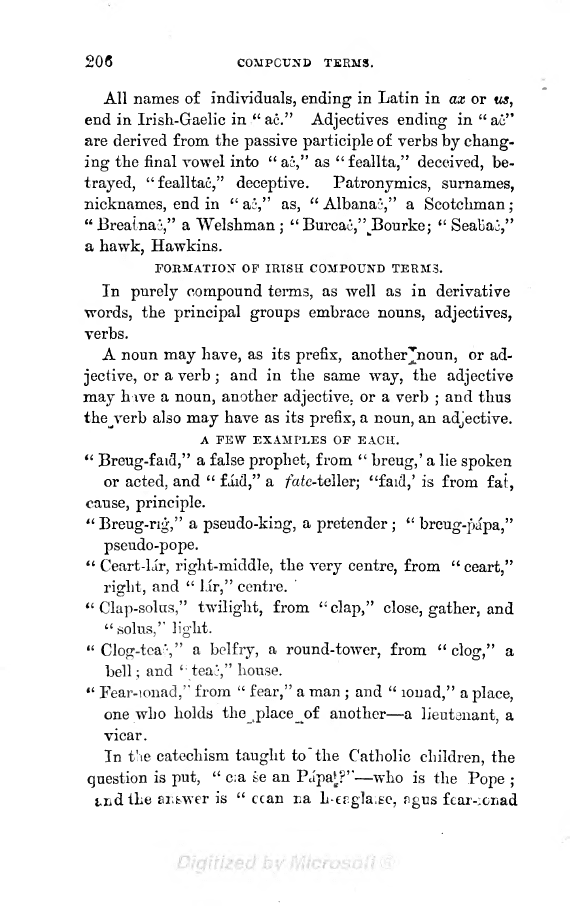
206 COMPOUND TERMS.
All names
of
individuals,
ending
in
Latin
in
ax or
us,
end in
Irish-Gaelic
in
"
ac."
Adjectives
ending
in
"
a6"
are
derived from
the
passive participle
of
verbs
by
chang-
ing
the final
vowel
into
"
ac;,"
as
"
feallta," deceived,
be-
trayed,
"fealltac,"
deceptive.
Patronymics,
surnames,
nicknames,
end in
"
ai," as,
"
Albana'-,"
a
Scotchman
;
"
BreatnaV'
a
Welshman;
"Burcac,"
k
Bourke;
"
SeabaJ,"
a
hawk,
Hawkins.
FORMATION OF IRISH
COMPOUND TERMS.
In
purely
compound
terms,
as well as
in
derivative
words,
the
principal groups
embrace
nouns,
adjectives,
verbs.
A
noun
may
have,
as
its
prefix,
another][noun,
or
ad-
jective,
or
a
verb
;
and in the
same
way,
the
adjective
may
hive
a
noun,
another
adjective,
or a
verb
;
and
thus
the^verb
also
may
have
as
its
prefix,
a
noun,
an
adjective.
A
FEW EXAMPLES
OF
EACH.
"
Breug-faid,"
a
false
prophet,
from
"
breug,'
a
lie
spoken
or
acted,
and
"
faid,"
a
fate-toller;
"faid,'
is
from
fat,
cause,
principle.
"
Breug-ng,"
a
pseudo-king,
a
pretender
j
"
breug-papa,"
pseudo-pope.
"
Ceart-lar,
right-middle,
the
very centre,
from
"
ceart,"
right,
and
"
lir,"
centre.
"Clap-solus,"
twilight,
from
"clap," close,
gather,
and
"solus,"
light.
"Clog-tea*,"
a
belfry,
a
round-
tower,
from
"clog,"
a
bell
;
and
'
:
teai,"
house.
"
Fear-ionad,"
from
"
fear,"
a man
;
and
"
lonad,"
a
place,
one
who
holds
the
t
place
jof.
another
a
lieutenant,
a
vicar.
In
the
catechism
taught
to 'the
Catholic
children,
the
question
is
put,
"
c;a se
an
Papa*,?''
who
is
the
Pope
;
tndthe
aiibwer
is
"
ccan na
L-e?gla;ge,
agus
fear-:ciiad
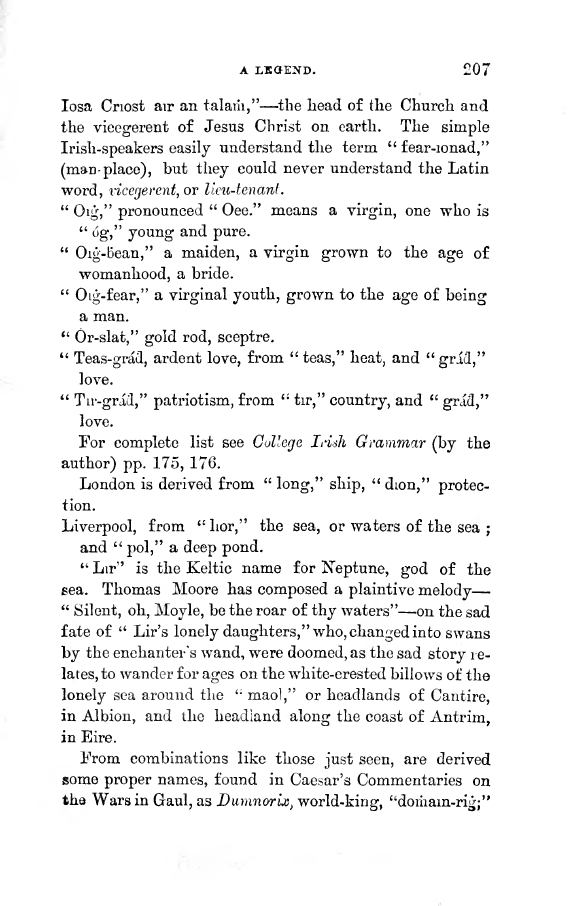
A
LEGEND.
207
losa
Criost
air
an
talarii,"
the head of the
Church
and
the
vicegerent
of Jesus
Christ
on
earth. The
simple
Irish-speakers
easily
understand
the term
"
fear-ionad,"
(man
-place),
but
they
could
never
understand
the Latin
word,
vicegerent,
or lieu-tenant.
"
Oig," pronounced
"
Oee."
means
a
virgin,
one
who is
"
6g," young
and
pure.
"
Oig-bean,"
a
maiden,
a
virgin grown
to
the
age
of
womanhood,
a
bride.
"
Oig-fear,"
a
virginal
youth, grown
to the
age
of
being
a
man.
"
Or-slat,"
gold
rod,
sceptre.
"
Teas-grad,
ardent
love,
from
"
teas,"
heat,
and
"grid,"
love.
"
Tir-grad," patriotism,
from
"
tir,"
country,
and
"
grad,"
love.
For
complete
list
see
College
Insli
Grammar
(by
the
author) pp.
175,
176.
London is derived from
"
long,"
ship,
"
dion,"
protec-
tion.
Liverpool,
from
"
lior,"
the
sea,
or
waters of
the
sea
j
and
"
pol,"
a
deep pond.
"
Lir" is
the Keltic
name for
Neptune,
god
of
the
sea.
Thomas
Moore has
composed
a
plaintive
melody
"
Silent, oh,
Moyle,
be
the roar of
thy
waters"
on
the
sad
fate of
"
Lir's
lonely daughters,"
who,
changed
into
swans
by
the enchanter's
wand,
were
doomed,
as the
sad
story
re-
lates,
to wander for
ages
on the
white-crested
billows
of
the
lonely
sea
around the
"
maol,"
or
headlands of
Cantire,
in
Albion,
and the headland
along
the
coast of
Antrim,
in Eire.
From
combinations like
those
just
seen,
are
derived
some
proper
names,
found in
Caesar's
Commentaries
on
tha
Wars in
Gaul,
as
Dnmnorix
>
world-king,
"domam-rig;"

208
KELTIC NAMES
IN CJESAR.
Bituriges,
life-king,
"
beata-rig
;"
Caturiges,
battle-king,
"
cata-ng."
Rig
means
king;
"
dotiian,"
the
world;
*'
bepta,"
life
;
"
cata,"
of
battle
(gen.
case.)
The
prefix
"
bean,"
a
woman
;
Latin
femina
;
changes
the
gender
of the
noun,
as
"tigearna,"
a
Lord;
"bean
tigearna,"
a
lady
;
"
bean-naom,"
a female saint
;
"
bean-
ogla-'-,"
a female attendant.
"
Leat,"
half,
has
the mean-
ing of
one
of
hvo,
as
"
leat-taoB,"
a
side,
one of
the
two
sides
;
"
leat-suil,"
one of two
eyes
;
"
leat-lum,
not half-
hand,
but
one of two
hands
;
"
leat-cos,"
not
half-a-foot,
but
one
foot
of
two
feet,
&c.
Again,
there
are
compounds
in
which the
second
noun
is
governed
in
the
genitive
case
by
the
first
; as,
"
fear-
feasa,"
a man
of
knowledge,
a seer
;
"
feasa"
is
gen.
case
of
"
fios,"
knowledge
;
'
cu-mara,"
an
otter,
literally,
dog
of
the sea
;
"
mara"
is
gen.
case of
"
muir
;"
"
mac-t're,"
a
wolf,
literally,
son
of
the
country
;
just
as in
French
cliemin-de-f<.r,
or
in
English
man-of-war.
In
this
way
other
nouns of
Keltic
origin
are
explained
;
as
Orgetorix,
means
"
urrc,-gaC--toruis,"
that
is
the-stay
(urra)
of
-every-
journey
;
"
toru?,"
a
journey,
makes
gen.
case
"toruis"
(pr.orm/\);
to which
the
Latin
sound
torix,
is
nearly
equivalent.
We
say
in Irish
just
now
"
Is
mait
an
urra
tu,"
you
are a
good
"
urra,''
that
is a
sup-
port,
one
to
fall
back
on,
a
bail
;
Cinngetorix,
(fear)
"
cmn-
gac-toruis,"
the
head-man-of-every-expedition
;
root,
"ceann,"
head,
gen.
"
cmn"-fear
man
omitted.
Vergol<ret,
"
fear-go-bret,"
a man
for
judgment,
from
"
fear,"
a
man,
"
go,"
for,
"
bret,"
judgment.
Vergtlius,
Yirgil,
is of
this
class
;
it
is
derived
from
"
fear,"
a
man,
Latin,
vir,
and
"
geal,"
fair,
a
man
of
fair
hair.
Voriigern
y
or
Vcrtigzrn,
the
name
of
the
king
who called in
the
Saxons,
comes
from
"fear,"
man,
and
"tigear-na,"
Lord,
that
is,
the man-
eovereign.
The
name
"
Ailban"
given
first
to
Britain,
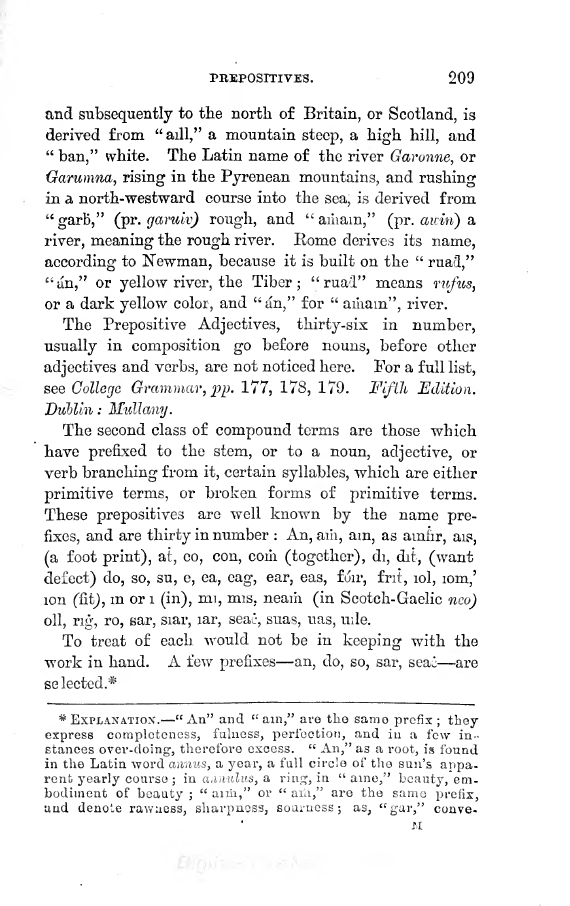
pnEposmvEs.
209
and
subsequently
to
the north
of
Britain,
or
Scotland,
is
derived
from
"
aill,"
a
mountain
steep,
a
high
hill,
and
"
ban,"
white.
The
Latin
name of the
river
Garonne,
or
Garumna,
rising
in the
Pjrenean
mountains,
and
rushing
in a north-westward
course into
the
sea;
is
derived from
"garB,"
(pr.
garuiv) rough,
and
"
amain,"
(pr.
awin~)
a
river,
meaning
the
rough
river.
Rome
derives
its
name,
according
to
Newman,
because
it
is
built on
the
"
ruad,"
"an,"
or
yellow
river,
the
Tiber;
"ruad"
means
rufus,
or
a
dark
yellow
color,
and
"an,"
for
"
amain",
river.
The
Prepositive
Adjectives,
thirty-six
in
number,
usually
in
composition
go
before
nouns,
before
other
adjectives
and
verbs,
are not
noticed
here.
For
a
full
list,
see
College
Grammar,
pp.
177, 178,
179.
Fifth
Edition.
Dull
in :
Mullany.
The
second
class
of
compound
terms
are those
which
have
prefixed
to the
stem,
or to
a
noun,
adjective,
or
verb
branching
from
it,
certain
syllables,
which
are
either
primitive
terms,
or broken
forms of
primitive
terms.
These
prepositives
are
well
known
by
the
name
pre-
fixes,
and
are
thirty
in
number :
An, am,
am,
as
amfir,
aip,
(a
foot
print),
at,
co,
con,
com
(together),
di,
dit,
(want
defect)
do,
so,
su, e, ea,
eag,
ear, eas,
fuir, frit, id,
iom,'
ion
(fit),
in
or i
(in),
mi,
mis. nearii
(in
Scotch-Gaelic
neo)
oil,
rig,
ro,
sar,
siar,
lar,
seac, suas,
uas,
uile.
To
treat
of
each
would
not
be in
keeping
with
the
work
in hand.
A
few
prefixes
an,
do, so,
sar,
seac
are
selected.*
*
EXPLANATION.
"An"
and
"am,"
are the
same
prefix;
they
express
completeness,
fulness,
perfection,
and in
a
few in-
stances
over-doing,
therefore
excess.
"
An,"
as a
root,
is
found
in the Latin
word
annus,
a
year,
a fall circle
of
the
sun's
appa-
rent
yearly
course
;
in
annulus,
a
ring,
in
"
aine,"
beauty,
em-
bodiment of
beauty
;
"
aim,"
or
"
am,"
are the
same
prefix,
and denote
rawuess,
sharpness,
sourness
;
as, "gar,"
conve-
M
